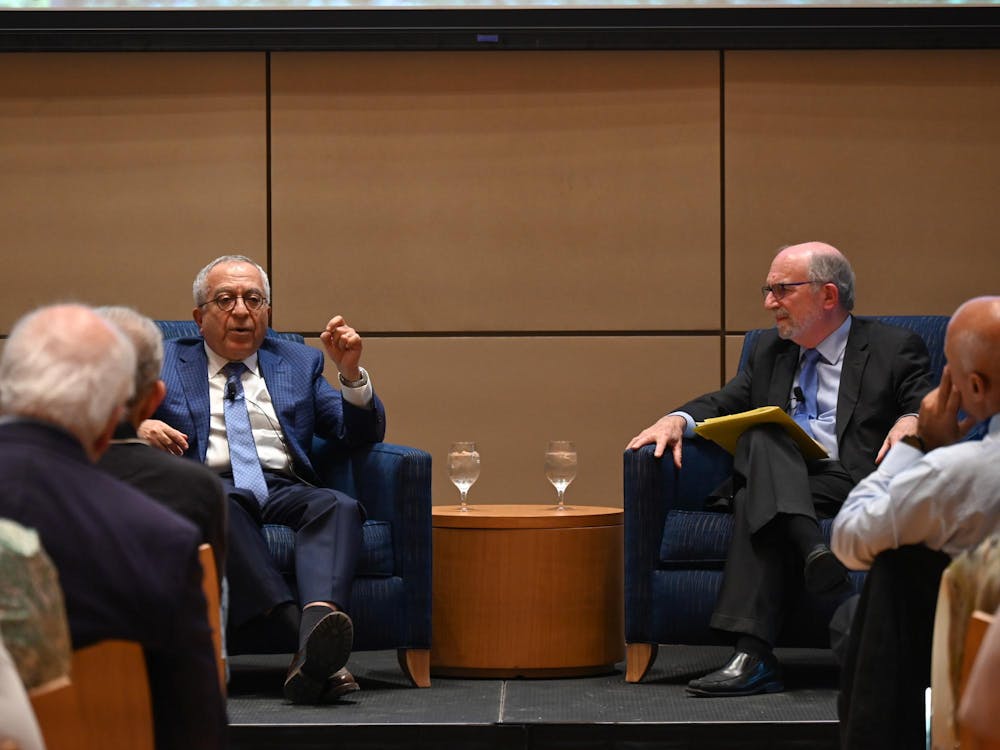Salam Fayyad, former prime minister of the Palestinian Authority, spoke at a Monday event about the viability of the two-state solution and the need for a more inclusive approach to the Israeli-Palestinian conflict.
Held at the Karsh Alumni and Visitors Center, the talk was a part of the Provost’s Initiative on the Middle East, a year-long initiative hoping to foster civil engagement and respectful debate on the ongoing Israel-Hamas war. Bruce Jentleson, William Preston Few distinguished professor of public policy and head of the provost’s initiative, moderated the conversation.
As prime minister, Fayyad led reform plans aimed at improving infrastructure and modernizing public services from 2007 to 2013. He also served two terms as the finance minister of the PA, briefly served as foreign affairs minister and held positions at the International Monetary Fund.
Fayyad opened the discussion by emphasizing the importance of listening to others to foster a campus environment of civility and dialogue.
He believes that as students step out of their comfort zones and explore different communities, they will “discover that there's a lot to not only talk about but absorb massively, understand and appreciate in our collective drive to move to a better tomorrow for all.”
Fayyad argued that the two-state solution, in which an independent Palestinian state coexists alongside Israel, is still a viable option but would require defining what Palestinians hope to achieve out of it. He said that before entering any political settlements, the safety, dignity and natural rights of people should take precedence during the decision-making process.
Fayyad identified two components that are crucial in promoting inclusivity and advancing a sustainable peace solution between Israel and the Palestinian people.
First, the Palestinian government should not base itself on the “exclusion formula,” but rather find a solution to the conflict by unifying the Palestinian people.
Fayyad asserted that Hamas’ rejection of the peace process in the Oslo Accords should not deter the Palestinian people from internalizing the values of liberty, democracy and equality. He further suggested that an inclusive government must be made up of representatives who embody the principles of the Oslo Accords and its commitment to free elections and nonviolence.
“If we really get ourselves into this mindset, [we could] deliver the kind of freedom, liberty and dignity that we want, not only for ourselves, but for people around the world,” Fayyad said. “… It's that sense of self-responsibility and self-empowerment that we should advise to the world … because that can set the stage for much better international existence.”
Second, Fayyad noted the importance of good governance that prioritizes the needs of the Palestinian people over the personal interests of politicians.
Instead of discussing Israel’s responsibilities in the conflict, Fayyad reflected on what the Palestinians need to do to bring lasting peace and security to the region. He pointed out that the Palestinian government’s investment in infrastructure, education, health care and social services can promote the “transformation [that] needs to take place amongst people.”
“If you become better able to represent your own people and project them with confidence, you feel more empowered, you get to vote or be able to get tough positions that you otherwise [wouldn’t],” Fayyad said.
Get The Chronicle straight to your inbox
Signup for our weekly newsletter. Cancel at any time.
Lucas Lin is a Trinity first-year and a university news editor of The Chronicle's 120th volume.

